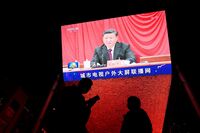Why All Eyes Are on China’s Communist Party Meeting
What You Need To Know
President Xi Jinping is huddling his ruling Communist Party one last time before likely defying precedent to secure a third five-year term in power at next year’s twice-a-decade party congress. From Nov. 8 to 11 about 400 men (and a dusting of women), including state leaders, military chiefs, provincial bosses and top academics, will convene at a heavily guarded military hotel in Beijing.
Like most things in elite Chinese politics, the meeting takes place behind closed doors, with the outcome only revealed in a communique afterward — with any squabbling and in-fighting edited out.
But there are signals to read. The sixth plenum — as this gathering in China’s five-year political cycle is called — generally focuses on party issues and kicks off a season of political reshuffles. All signs point to Xi issuing a so-called “historic resolution” to cement his power, as he prepares to pull-off the ultimate leadership shake-up and defy the two-term example set by his predecessors, potentially setting himself up to be the country’s leader for life.

Key Coverage
By The Numbers
- 10 The number of years Chinese leaders can stay in power for (two five-year terms). Until Xi, that is...
- 400 Roughly the number of Communist Party members who will attend the plenum.
- 1945 & 1981 The only years China's leaders have ever issued a formal "resolution on history."
Why It Matters
Only Mao Zedong and Deng Xiaoping have ever issued a “resolution on history,” in 1945 and 1981, respectively. Following their lead would put Xi on par with those titans of the party. While his predecessors’ magnum opuses criticized party missteps — Deng, for example, branded Mao's Cultural Revolution a “catastrophe” — Xi is expected to spin a victorious tale of a century of success, glossing over failures and outlining his vision for a modern Marxist society. Getting the party to sign on to his take on Chinese history would be a huge sign that he’s got the power base to secure that coveted third term.
As leader of the world’s second-largest economy — and a fifth of its people — Xi’s potential to lead for life has huge ramifications. China’s most important man is already on a mission to redistribute the nation’s wealth to build what he says would be a fairer society. That “common prosperity” campaign wiped about $1 trillion off the value of Chinese stocks globally in July, and impacted the business of everyone from delivery drivers and after-school teachers to tech giants and celebrities, with major fallout for global investors.
Xi has already written his name into the party's charter and the country's constitution. A party resolution affirming his interpretation of history would put him in a stronger position than ever ahead of next year's politicking. It could embolden him to execute more economic reforms and tussle with the U.S. on everything from trade to Taiwan.
In July, Xi called bringing the democratically ruled island under the party’s control a “historic mission.” But doing so by force is often cited as one thing that could actually send Washington and Beijing to war. With his reign extended, Xi would have time to formulate and execute a plan, cementing his legacy as the leader who reunified China. Or the leader who led his country into conflict.
Timeline
-
2 years ago Next China: Mao, Deng and Xi
-
2 years ago Xi Kicks Off China’s ‘Election Season’










